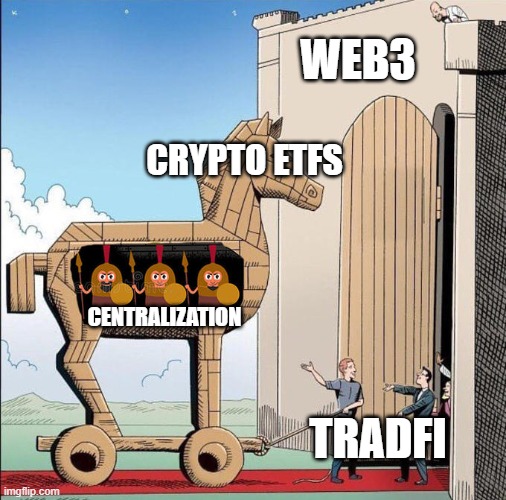Last updated on February 25th, 2025 at 02:00 pm
The recent introduction of Exchange-Traded Funds (ETFs) for Bitcoin, Ethereum, and Solana has been hailed as a landmark moment for crypto. Many in the sector believe these crypto ETFs will improve liquidity and drive broader adoption. However, there is a much more complex story behind this that warrants careful examination.
These ETFs might not be the breakthrough they appear to be. Instead of enhancing the crypto ecosystem, they could actually undermine it.
By turning Bitcoin, Ethereum, and Solana into products that are traded like stocks, these ETFs might shift focus away from their core purpose: creating decentralized, peer-to-peer systems. So, while ETFs might offer quick financial benefits, they could dilute the fundamental values and goals of cryptocurrencies.
Deviation from Foundational Principles
Bitcoin, Ethereum, and Solana were originally designed for specific purposes: Bitcoin for peer-to-peer payments, Ethereum for smart contracts and decentralized applications, and Solana for high-speed, low-cost transactions. By turning these cryptocurrencies into investment products, ETFs shift the focus from their practical uses to their value as speculative assets.
This transformation risks making cryptocurrencies more about trading rather than financial innovation and decentralized transactions, contrary to the vision of Satoshi Nakamoto, the pseudonymous creator of Bitcoin.
Nakamoto’s goal was to create a financial system where transactions could be made directly between individuals without intermediaries like banks. Crypto ETFs reintroduce these intermediaries into the crypto ecosystem.
While this involvement may seem like a step towards mainstream acceptance, it introduces a new layer of complexity to the crypto world.
These institutions could potentially (and would, eventually) influence or even control the crypto market in many more ways that undermine its foundational principles.
The Trojan Horse Effect: TradFi and Government Influence
Traditional financial institutions, like banks and investment firms, see crypto ETFs as a way to bring cryptocurrencies into the mainstream. By offering these ETFs, they can attract more investors, especially those who find cryptocurrencies too complicated or risky. This is what many crypto faithfuls believe.
But this involvement disguises something else: it could also shift the control of the crypto market. TradFi institutions operate under traditional regulations and might push for rules that suit their interests. This could affect how cryptocurrencies are used and developed, potentially moving them away from their original goals. For example, they might support regulations that prioritize traditional financial models over innovative ideas like yield farming and staking.

While some regulation can provide benefits such as increased security and legitimacy, it also risks stifling innovation. Overly restrictive rules might limit the ability of crypto projects to operate freely and develop new technologies. For example, regulatory measures designed to protect investors could hinder the growth of decentralized applications (dApps) and other innovations. If regulations become too stringent, they might restrict the aspects that make cryptocurrencies unique and valuable, shifting the focus from decentralization to compliance with traditional financial norms.
RELATED: Spotlight on Grayscale: Analysing the U.S. SEC’s Decision to Let Bitcoin ETFs Shine
This is not to mention these institutions’ opportunistic tendencies. Right now, the trading fees and other fees associated with the ETFs are very low, but that is only going to be for a while.
The Undesirable Effects of Crypto ETFs On Investors and Market Participants
Speaking of price swings, crypto ETFs also affect how market participants behave towards these digital assets.
While ETFs simplify the investment process, making crypto investments more accessible to traditional investors, this ease of access could alter how people perceive cryptocurrencies. Instead of viewing them as tools for decentralized transactions, investors may see them primarily as investment assets. This change in perception could influence the broader narrative around the purpose and value of cryptocurrencies.
The availability of crypto ETFs will likely attract many short-term speculators to the market. These investors focus on making quick profits from price fluctuations rather than using cryptocurrencies for their intended purposes.
RELATED: Where on Earth Can You Trade Spot Bitcoin ETFs Legally?
As a result, their buying and selling of ETF shares based on market trends or news can lead to greater and more frequent price swings in cryptocurrencies. This increased speculative trading makes the market more volatile than it is now, with prices fluctuating more due to trading activities than changes in the underlying technology or adoption rates of the cryptocurrencies.
Additionally, the entry of large institutional investors, who can make substantial trades at once, might further amplify price volatility.
The U.S. Securities and Exchange Commission (SEC) ’s approval of the first Bitcoin spot ETFs in January 2024 is a prime example of this shift. In the initial days, these ETFs traded volumes of up to $4.6 billion, leading to Bitcoin reaching an all-time high of $73,750 by mid-March 2024. However, this development also introduced more volatility to the market, with significant price swings and discrepancies between the ETF’s value and Bitcoin’s spot price.
The True Cost of Mainstream Adoption
Do crypto ETFs have any benefits?
Yes, they do. The primary and most obvious one is increased mainstream adoption. More people can participate without needing special accounts or knowledge of the technology. You don’t have to buy, store, or manage the digital assets; the ETF issuers do that.
However, as we have said many times in this post, the big problem is that treating cryptocurrencies, especially bitcoin, as mere speculative investment assets defeats the whole purpose of their creation. They were meant to replace money as we know it, to usher in a new era of finance, the one that gives power to the people, not to reinforce the existing system of some individuals sitting at the top of the pyramidal food chain.
The other benefits crypto ETFs seem to provide—spreading out investment risks because of the plurality of the tokens in a fund, reduced concerns about fraud and market manipulation because of trading on regulated exchanges, and high liquidity—are only distractions from the ultimate goal of actualizing that prized future of money.
The true cost of these moves should be evaluated. Do these advantages justify the risk of compromising and deviation from the fundamental principles of decentralization and innovation that cryptocurrencies were founded upon? Are they enough to outweigh the potential drawbacks and concerns about their impact on the broader crypto ecosystem?
The whole crusade of being an alternative to the current financial status quo will slowly be lost if the sector settles on its oars and thinks getting the government agencies to approve crypto ETFs is the biggest thing to be done to achieve mainstream adoption. It is one thing, but it’s not the best thing: getting the common man to deem it a worthy medium of value exchange and use it as such is a better goal to chase, in our opinion.
Disclaimer: This article is intended solely for informational purposes and should not be considered trading or investment advice. Nothing herein should be construed as financial, legal, or tax advice. Trading or investing in cryptocurrencies carries a considerable risk of financial loss. Always conduct due diligence.
If you would like to read more articles (news reports, market analyses) like this, visit DeFi Planet and follow us on Twitter, LinkedIn, Facebook, Instagram, and CoinMarketCap Community.
“Take control of your crypto portfolio with MARKETS PRO, DeFi Planet’s suite of analytics tools.”




















